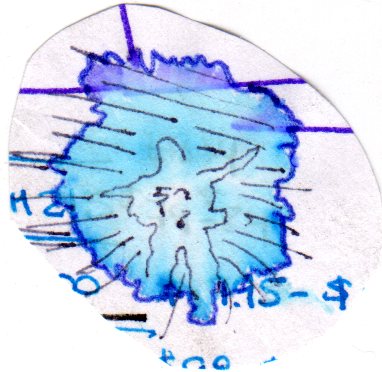 |

Bio
ABOUT ME
My
hands hover over the keyboard, buffered by a pair of woolen wristers,
fingers free to peck at the keys like a chicken scratching for grain that
escaped the reaper’s scythe. I could explain away these wristers
as “all the rage in Quebec this year.” But that would be a
lie. I could justify them by saying that my wife is a weaver with a love
of things fiber -- that she gave me the wool-silk blend to match my winter
coat. I could bravely quip that I’m a man who knits and that I worked
up this pair of hand socks during a long winter blizzard.
But that wouldn't tell the real story.
The simple truth is that I live in the house that Woody built –
a stacked cordwood hobbit hole that clings to a granite ledge barely concealed
by the thin crust of fertile soil blanketing Vermont’s Northeast
Kingdom. Like the prow of an earth ship, my office faces into the north
wind. Far removed from the activity of day-to-day living – far from
the wood stove, a favorite spot for my family to congregate after barn
chores on a cold winter morning - my office and I buffer the rest of the
house from the worst that Old Man Winter can throw at us. On a bad day,
the temperature at keyboard level plummets to a brisk 50 degrees. But
on days when the sun burns through the layer of frost on the inside of
the window panes, I bask in a balmy 55. These wristers keep my fingers
warm enough to fly fluently across the keyboard regardless of temperature.
And fluency, of any kind, is important to me. I’m a man with many
countries -- feet planted in one, heart firmly rooted in a half dozen
others. Born to a family of Italian immigrants who never quite lost their
taste for dialect, at eight years old I was going to school in Colombia,
splitting my time between a farm near Cartagena and a house in Barranquilla.
Seven years later, comfortably enrolled in a university in western France,
my penchant for languages (dead, alive, foreign or domestic) served me
in good stead. I picked grapes in a Vendéen vineyard – cold,
tiring and boring work undertaken in the company of a dozen other more
highly skilled migrant and illegal workers. I finished the summer with
a killer tan, a stronger back, a healthy respect for the dangers of too
much wine and with a smattering of Portuguese, Esperanto and Russian.
I stayed in Taizé, an ecumenical community in the south of France,
where the good brothers housed youth from all over Europe in circus tents.
My pallet lay next to that of Dav and Cri, a young couple who obligingly
introduced me to the beauty of Catalan. I trekked to the Pyrenees during
the transhumance, when shepherds drive their flocks into mountain pastures,
transforming their milk into traditional sheep cheese each day –
a place where any knowledge of French and Spanish pales in comparison
to a willingness to lend a hand and curse like the locals -- in Basque.
Fluency, or the semblance thereof, has been my carte blanche, allowing
me access to experiences I might never have otherwise.
A cultural and linguistic chameleon, I can go somewhere -- almost anywhere
-- and fit in, sounding and looking as though I belong to that place.
Small wonder that in my professional life as a translator/interpreter,
languages have always been my stock in trade. In my writing life, the
ability to blend helps me uncover the naked truth.
I may homestead on the agrarian edge, heat my house with wood, grow 80%
of my own food and herd my flock of bilingual sheep on the border between
Vermont and Quebec, but my work frequently takes me deep into the heart
of the urban jungle or to the edge of the suburban hinterlands. I admit
it, the world is my oyster – an oyster I like to eat raw with loud
slurping noises.
Whether interviewing the mother of sheep dairying in Quebec, or an attorney
in London who represents inmates at Guantanamo Bay,
I speak their language.
Whether connecting with the staunch, Christian Midwestern horse farmer
whose mares join the urine string each winter (providing estrogen for
the masses), or talking with the owner of a dog resort whose civil union
is in the process of dissolving,
I speak their language.
Sometimes the voices
are older and fainter, and I must strain to hear them clearly. It often
takes me more time and finesse to interpret their messages for a modern
audience. Take, for instance, the 2nd century Roman farmer who was unknowingly
speaking to the denizens of a 25-story high-rise in Manhattan; the 12th
century Italian whose writings about plague in Europe are equally as relevant
to contemporary society’s response to the spread of AIDS or avian
flu; or the 13th century dame whose musings on life could have been written
by a 21st century feminist.
I speak their language
too.
The chorus of these
voices informs my writing. And as truth knows no borders – neither
linguistic, geopolitical nor temporal -- I’m looking for the kernel
of truth in a river of grain. This single kernel is often shattered and
dispersed, in need of being collected and put back together before the
truth can be told. And so I get down to the work of reaping its story.
I’m willing to brave Baudelaire’s worms and maggots, to get knee deep in manure, sourdough or wine must -- all in an effort to get at the truth. And once I'm certain there is something in the pile, after days, weeks or even months of research, I steal into the chill of my office, slip that pair of handknit wristers over my hands, and sift through the freshly harvested information, hoping to find a lone, sproutable grain of truth to plant in the tilled consciousnesses of my readers.
